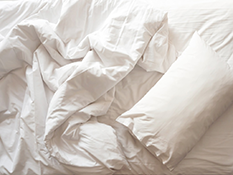Are you feeling restless, irritable or tired? Many older adults do not get enough sleep, and that can lead to health and memory problems.
The National Institute on Aging recommends that adults 65 and older get 7 to 9 hours of sleep each night. Good sleep improves brain performance and mood, removes toxins from the body and strengthens immune health. But many things can get in the way of a good night’s sleep. The need to work more or to live in a loud neighborhood are social determinants of health that disrupt sleeping habits. Adults have plenty of excuses to avoid rest or believe that 5 hours of sleep is enough. But the truth is, poor sleep habits, especially lack of “deep sleep,” can raise serious health issues.
Poor sleep is often linked to diabetes, heart disease, hypertension and obesity, according to Dr. Temitayo (Temi) Oyegbile-Chidi, an associate professor at the University of California, Davis and Chair of the National Sleep Foundation Sleep Health Equity Task Force. “When we sleep, we’re able to get our blood pressure down to normal,” Oyegbile-Chidi said. “We’re able to get everything back to baseline. And if we don’t do that, we’re constantly basically working on all eight cylinders. It overworks the heart, brain, different parts of our body, vascular system, blood pressure, etc.”
What Are the Different Types of Sleep?
There are different stages of sleep, and all are important. We dream during REM (rapid eye movement) sleep, but non-REM sleep happens first. It includes three stages. The last two stages of non-REM sleep are when you sleep deeply, and it’s hard to wake up from this stage of sleep. During non-REM stages, your body builds bone and muscle, repairs and regenerates tissues and strengthens the immune system.
REM sleep happens 60-90 minutes after falling asleep. Oyegbile-Chidi explains that REM sleep is when our brains are working hardest. “If we learned something specifically during the day, we do a lot of memory consolidation and learning during that period,” the sleep specialist said. “But we also do a lot of cleaning out the toxins in our bodies, quieting down our systems, so no matter how stressful the day was, it’s a time to fully come back to baseline so that we can prepare and be refreshed and ready for the next day.”
Cranky? Blame lack of REM sleep. It means your brain’s frontal lobe isn’t working as clearly, and that makes it harder to control your emotions.
Prepare at Night for Strong Sleep Habits
Chances are, before nodding off each night, you’re looking at your phone, watching TV or engaging with some sort of screen. That screen time is one of the biggest problems for those not getting enough sleep per night. The screen stimulates the brain by keeping it more active and awake which can keep you from falling asleep. If you happen to wake up in the middle of the night and check your phone, that also restarts your brain and makes it harder to fall into a deep sleep. Plus, the blue light from the screen can affect your internal body clock and throw off your sleep timing.
Because of work schedules or a busy lifestyle, you may be eating your meals late at night, sometimes close to bedtime. Heavy meals, too much caffeine and alcohol can keep you from falling asleep quickly and enjoying 8 hours of sleep. If you’re tired at work and need five cups of coffee to stay awake all day, or find you’re falling asleep while driving, then your sleep is not adequate.
Establishing strong sleep habits is vital to staying healthy. Oyegbile-Chidi said savvy sleep hygiene includes a consistent routine, a dark and relaxing room without TV or cellphones for at least an hour before bedtime, and a relaxing setting.
“Things like loud snoring or having a bed that really flops all over when someone turns over can be very disruptive,” Oyegbile-Chidi said. “But at the same time, we know that there’s something very calming about being around family, being around people you love as you fall asleep.”
Some people do suffer from serious sleep disorders like beathing trouble or sleep apnea. So, it’s important that you solve sleep troubles with your doctor and not just temporarily with melatonin pills or some other sleep aid.




